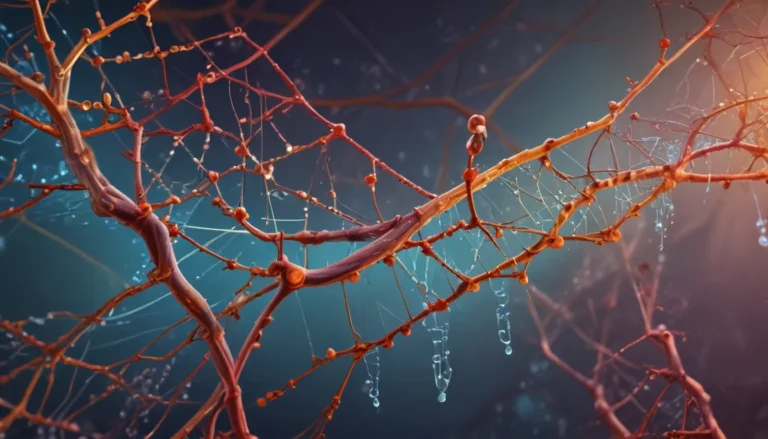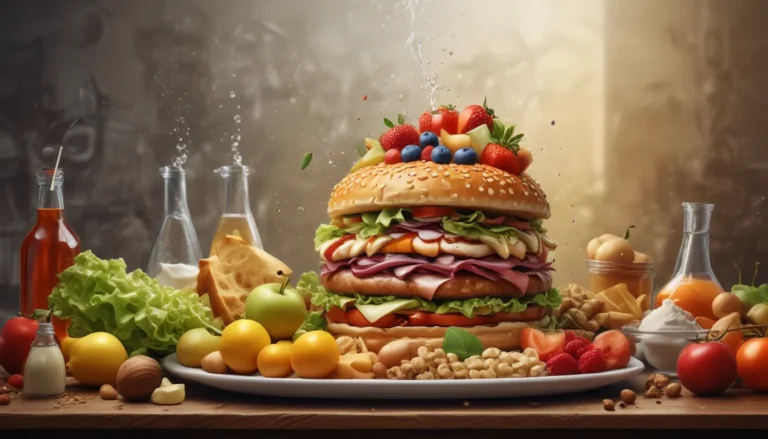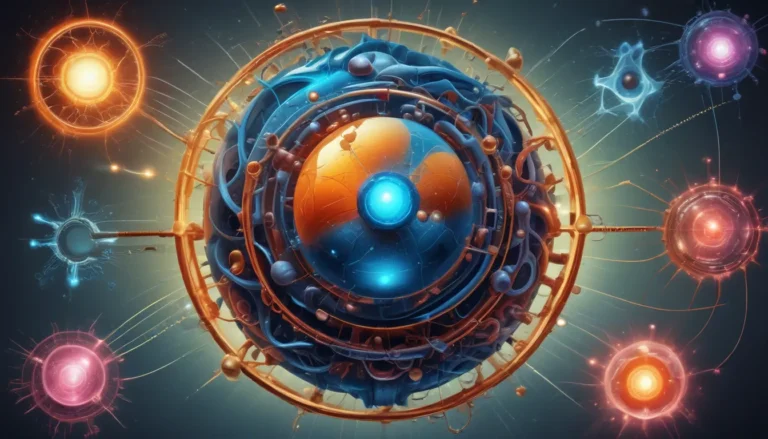A Note About Images: The images used in our articles are for illustration purposes only and may not exactly match the content. They are meant to engage readers, but the text should be relied upon for accurate information.
Are you curious about the captivating world of lipid metabolism? Have you ever wondered how fats, oils, and cholesterol play a vital role in maintaining your overall health? Look no further, as we delve into 18 extraordinary facts that illuminate the complexity and importance of lipid metabolism. From the breakdown of fatty acids to the formation of lipoproteins, this journey will enrich your understanding of this essential biochemical process.
The Backbone: Triglycerides
At the core of lipid metabolism lies triglycerides, the primary storage form of lipids in our bodies. Comprised of a glycerol molecule linked to three fatty acids, triglycerides serve as an energy reserve vital for our physiological functions.
Unraveling Lipid Digestion: A Journey in the Small Intestine
When we consume dietary fats, the magic of lipid digestion begins in the small intestine. Enzymes called lipases diligently break down triglycerides into free fatty acids and monoglycerides, allowing for their absorption into the bloodstream.
The Lifeline of Fat-Soluble Vitamins
Vitamins A, D, E, and K, known as fat-soluble vitamins, heavily rely on lipid metabolism for their absorption, transportation, and storage in the body. Lipids act as valuable facilitators in enhancing the bioavailability of these essential nutrients.
The Majestic Liver: A Powerhouse for Lipid Metabolism
Behold the liver, a central figure in lipid metabolism! With its prowess, the liver synthesizes and packages lipids into very low-density lipoproteins (VLDL) for distribution to other tissues. Furthermore, it converts excess carbohydrates into triglycerides for storage, showcasing its multifaceted role.
Cholesterol: A Maestro in Lipid Regulation
Cholesterol, the master regulator in lipid metabolism, serves as a vital precursor for synthesizing steroid hormones, bile acids, and vitamin D. Its levels are meticulously controlled to uphold cellular equilibrium.
The Marvel of Lipoproteins
Embark on a journey through the intricate world of lipoproteins, specialized vehicles that transport lipids in the bloodstream. From chylomicrons to LDL and HDL, each lipoprotein plays a distinct role in lipid metabolism, influencing our overall health in profound ways.
Adipose Tissue: A Dynamic Ally in Lipid Management
Do not underestimate the prowess of adipose tissue! Beyond serving as a storage depot for lipids, adipose tissue actively participates in lipid metabolism by releasing stored triglycerides as fatty acids during times of energy demand.
Fatty Acids: Fueling the Body’s Engine
In times of fasting or vigorous exercise, our bodies turn to fatty acids as a prime source of energy. Through beta-oxidation in the mitochondria, fatty acids undergo oxidation to generate energy, meeting the body’s metabolic requirements.
Embracing Lipolysis: Liberation of Energy
Lipolysis, the breakdown of stored triglycerides into fatty acids and glycerol, is spurred by hormones like adrenaline and glucagon. This process provides a vital source of energy when the body demands it the most.
Ketone Bodies: A Clever Energy Alternative
When glucose is scarce, the liver orchestrates the production of ketone bodies through fatty acid metabolism. These ketone bodies emerge as an alternate energy source, particularly beneficial for the brain during prolonged fasting periods.
Navigating Genetic Disorders in Lipid Metabolism
Venture into the realm of genetic disorders that disrupt normal lipid metabolism, giving rise to conditions such as familial hypercholesterolemia and lipoprotein lipase deficiency. Explore how these disorders alter the intricate balance of lipid regulation.
Dietary Symphony in Lipid Metabolism
Embark on a culinary exploration of how dietary choices impact lipid metabolism. Discover the significance of a balanced diet, encompassing an optimal ratio of fats, carbohydrates, and proteins, in maintaining healthy lipid levels.
Exercise: A Catalyst for Optimizing Lipid Metabolism
Unlock the transformative power of exercise in enhancing lipid metabolism. By boosting the breakdown and utilization of stored fats, regular physical activity promotes the activity of lipoprotein lipase, facilitating the clearance of circulating triglycerides.
Hormonal Harmony in Lipid Regulation
Dive into the realm of hormonal regulation in lipid metabolism. Discover how insulin, glucagon, and leptin orchestrate the synthesis, breakdown, and storage of lipids, intricately balancing energy expenditure and appetite regulation.
Inflammation: A Disruptor in Lipid Metabolism
Explore the impact of chronic inflammation on lipid metabolism, unveiling its contribution to conditions like metabolic syndrome and atherosclerosis. Delve into how inflammatory cytokines impede insulin signaling and foster fat accumulation.
Gender Variances in Lipid Handling
Unveil the unique gender disparities in lipid metabolism, with women exhibiting higher HDL cholesterol levels and men being more prone to dyslipidemia. Hormonal influences contribute to these distinctions, shedding light on the nuanced interplay of factors.
Environmental Factors and Lipid Management
Embark on a journey through environmental influences on lipid metabolism, exploring how exposure to toxins like air pollution and endocrine-disrupting chemicals can derail lipid regulation. Gain insights into how environmental factors contribute to metabolic disorders.
Therapeutic Horizons in Lipid Metabolism
Peer into the promising realm of therapeutic interventions in lipid metabolism. Witness how targeting specific enzymes or signaling pathways associated with lipid metabolism holds potential in combating obesity, diabetes, and cardiovascular diseases.
Conclusion: Illuminating Horizons in Lipid Metabolism
In the grand tapestry of human biology, lipid metabolism stands as a captivating cornerstone. From synthesizing energy to constructing cell membranes, lipids weave a narrative of intricate functions essential for our well-being. The 18 extraordinary facts unearthed in this exploration shed light on the profound significance of lipid metabolism, paving the way for transformative discoveries and interventions to enhance human health.
FAQs: Navigating the World of Lipid Metabolism
-
What is lipid metabolism?
Lipid metabolism encompasses the biochemical processes regulating the synthesis, breakdown, and utilization of lipids in living organisms, playing a pivotal role in maintaining physiological functions. -
How are lipids synthesized in the body?
Lipids are synthesized through lipogenesis, a process converting carbohydrates and proteins into fatty acids that combine with glycerol to form triglycerides, the predominant storage form of lipids. -
What role do lipoproteins play in lipid metabolism?
Lipoproteins serve as essential transporters of lipids in the bloodstream, facilitating their transportation to various tissues and organs. Composed of a lipid core surrounded by proteins, lipoproteins are integral in lipid regulation. -
How does hormone regulation impact lipid metabolism?
Hormones like insulin, glucagon, and leptin play pivotal roles in regulating lipid metabolism. While insulin promotes lipid synthesis and storage, glucagon stimulates lipid breakdown, and leptin regulates appetite and energy expenditure. -
Can diet and exercise influence lipid metabolism?
Yes, dietary choices and physical activity significantly impact lipid metabolism. A balanced diet and regular exercise play crucial roles in maintaining healthy lipid levels by promoting lipid breakdown and utilization.
Your Journey to Knowledge: A Trusted Companion in Exploration
As you embark on your journey through the fascinating realm of lipid metabolism, trust in our commitment to delivering engaging and reliable content. Each fact shared on our platform is a testament to our dedication to upholding the highest standards of accuracy and authenticity. Join us in unraveling the wonders of lipid metabolism as we explore, learn, and grow together towards a healthier tomorrow.






